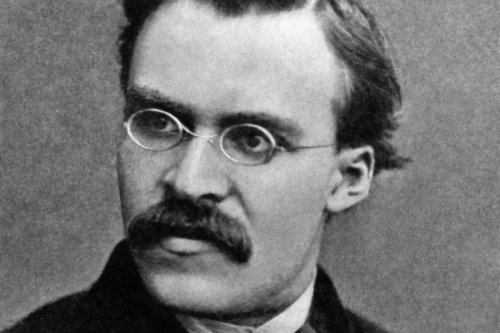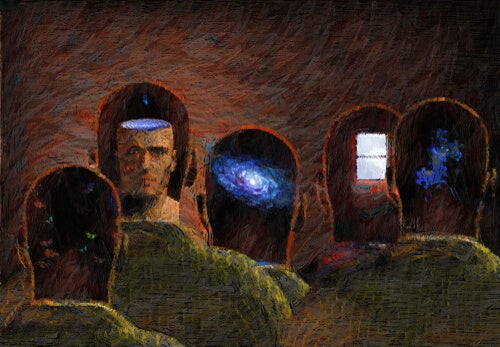Friedrich Nietzsche and the Will to Power

Friedrich Nietzsche was one of the most important philosophers of the nineteenth century, along with other prominent figures such as Sigmund Freud and Karl Marx. Many call these thinkers “philosophers of suspicion” due to their desire to unmask falsehood hidden under the enlightened values of rationality and truth. Nietzsche, in particular, spoke of the will to power. That’s what we’re going to be talking about in this article.
According to Nietzsche, Western culture is vitiated by having sought to establish rationality in all aspects of life. Ever since the start of Western culture in Greece, rationality always represented a sign of decadence. Everything that opposes the values of the instinctive and biological existence of man is decadent.
To understand Nietzschean philosophy, we must keep in mind his harsh criticism of Plato for postulating the world of ideas. His philosophy rejects these metaphysical traps: the rational world, the moral world, and the religious world. The fundamental principle of the Nietzschean theory is the concept of life. To understand what this thinker understood by “life”, one shouldn’t lose sight of the absolute negation of the rational Platonic world.
Nietzsche and the Concept of Life
For the German philosopher, life was based on two basic principles: the principle of conservation and the principle of increase.
He established that there’s only life insofar as it conserves itself. Of course, this capacity for conservation is due to constant movement and the need for expansion. If there’s no expansion in what we preserve, it’ll die. Life is able to expand itself thanks to every single thing that keeps us alive. All this vital space and its principles are what constitute us. This, in turn, is understood as the will to power.

The Will to Power in Nietzsche
The will to power refers to the evolution of life. One could say that life itself is the will to power since life really conquers what we long for. At the same time, life makes an effort to get what we want and dominate what we possess.
The will to power is life ejected towards a horizon where we’re able to find and get whatever we want. Therefore, it wants things to expand what it already has. However, it’s important to say that the will to power must love itself before longing for anything else. Only in this way, it’ll want to increase what it has in order to keep what’s already in its possession.
Imagine that you want to buy a car. However, you don’t have enough money to get it at the moment. The conservation of that desire will only be possible if you make an effort and try to expand your savings in order to pay for the desired car. If you do nothing to achieve that goal, that desire would just disappear. The longing and motivation will no longer be there.
The Will to Power Wants Itself
Once the will to power desires to conserve itself, it’ll automatically understand that it won’t be able to maintain everything it’s conquered only by conservation. Instead, in order to really conserve it, it must expand on to new horizons and conquer new grounds.
The will to power is intentional and projected towards the world of life, which is the only place where you can get what you want. The nature of this will is movement; it doesn’t want to stop, it wants to continue expanding. According to Nietzsche, if we settle for what we have at the moment and don’t try to expand it, we’ll die (in a metaphorical sense, meaning our will to power will be petrified).
Now, where does the truth lie, then? For this German philosopher, it’s clear that the truth resides in the will to power of each individual. According to Nietzsche, there’s a very close relationship between truth and power.

The Real Truth
Imagine that a certain media outlet publishes a news story in the morning. All other media platforms proceed to follow, and each one of them tells the story from their ideology’s perspective. It’s more than likely that every individual will take as ‘true’ the fact that best fits with their ideas.
Now imagine that due to the different versions of the media, controversy starts emerging and, at night, people from different media come together on a set to discuss the real truth of what happened. Evidently, the truths will collide precisely because there are only interpretations of the facts. It’s at this moment that a critical mind will understand that the truth is power’s daughter.
That being said, it’s obvious that power will always back the hegemonic truth, given that it’s a powerful expression of the will that wants to expand in order to preserve itself. To understand this, think about the totalitarian regimes whose truth was the truth.
For Nietzsche, any will to power that doesn’t intend to expand to conserve is just a life worth nothing: what we currently understand by nihilism (the word nihilism comes from the Latin nihil, undefined pronoun meaning nothing).
Friedrich Nietzsche was one of the most important philosophers of the nineteenth century, along with other prominent figures such as Sigmund Freud and Karl Marx. Many call these thinkers “philosophers of suspicion” due to their desire to unmask falsehood hidden under the enlightened values of rationality and truth. Nietzsche, in particular, spoke of the will to power. That’s what we’re going to be talking about in this article.
According to Nietzsche, Western culture is vitiated by having sought to establish rationality in all aspects of life. Ever since the start of Western culture in Greece, rationality always represented a sign of decadence. Everything that opposes the values of the instinctive and biological existence of man is decadent.
To understand Nietzschean philosophy, we must keep in mind his harsh criticism of Plato for postulating the world of ideas. His philosophy rejects these metaphysical traps: the rational world, the moral world, and the religious world. The fundamental principle of the Nietzschean theory is the concept of life. To understand what this thinker understood by “life”, one shouldn’t lose sight of the absolute negation of the rational Platonic world.
Nietzsche and the Concept of Life
For the German philosopher, life was based on two basic principles: the principle of conservation and the principle of increase.
He established that there’s only life insofar as it conserves itself. Of course, this capacity for conservation is due to constant movement and the need for expansion. If there’s no expansion in what we preserve, it’ll die. Life is able to expand itself thanks to every single thing that keeps us alive. All this vital space and its principles are what constitute us. This, in turn, is understood as the will to power.

The Will to Power in Nietzsche
The will to power refers to the evolution of life. One could say that life itself is the will to power since life really conquers what we long for. At the same time, life makes an effort to get what we want and dominate what we possess.
The will to power is life ejected towards a horizon where we’re able to find and get whatever we want. Therefore, it wants things to expand what it already has. However, it’s important to say that the will to power must love itself before longing for anything else. Only in this way, it’ll want to increase what it has in order to keep what’s already in its possession.
Imagine that you want to buy a car. However, you don’t have enough money to get it at the moment. The conservation of that desire will only be possible if you make an effort and try to expand your savings in order to pay for the desired car. If you do nothing to achieve that goal, that desire would just disappear. The longing and motivation will no longer be there.
The Will to Power Wants Itself
Once the will to power desires to conserve itself, it’ll automatically understand that it won’t be able to maintain everything it’s conquered only by conservation. Instead, in order to really conserve it, it must expand on to new horizons and conquer new grounds.
The will to power is intentional and projected towards the world of life, which is the only place where you can get what you want. The nature of this will is movement; it doesn’t want to stop, it wants to continue expanding. According to Nietzsche, if we settle for what we have at the moment and don’t try to expand it, we’ll die (in a metaphorical sense, meaning our will to power will be petrified).
Now, where does the truth lie, then? For this German philosopher, it’s clear that the truth resides in the will to power of each individual. According to Nietzsche, there’s a very close relationship between truth and power.

The Real Truth
Imagine that a certain media outlet publishes a news story in the morning. All other media platforms proceed to follow, and each one of them tells the story from their ideology’s perspective. It’s more than likely that every individual will take as ‘true’ the fact that best fits with their ideas.
Now imagine that due to the different versions of the media, controversy starts emerging and, at night, people from different media come together on a set to discuss the real truth of what happened. Evidently, the truths will collide precisely because there are only interpretations of the facts. It’s at this moment that a critical mind will understand that the truth is power’s daughter.
That being said, it’s obvious that power will always back the hegemonic truth, given that it’s a powerful expression of the will that wants to expand in order to preserve itself. To understand this, think about the totalitarian regimes whose truth was the truth.
For Nietzsche, any will to power that doesn’t intend to expand to conserve is just a life worth nothing: what we currently understand by nihilism (the word nihilism comes from the Latin nihil, undefined pronoun meaning nothing).
This text is provided for informational purposes only and does not replace consultation with a professional. If in doubt, consult your specialist.







